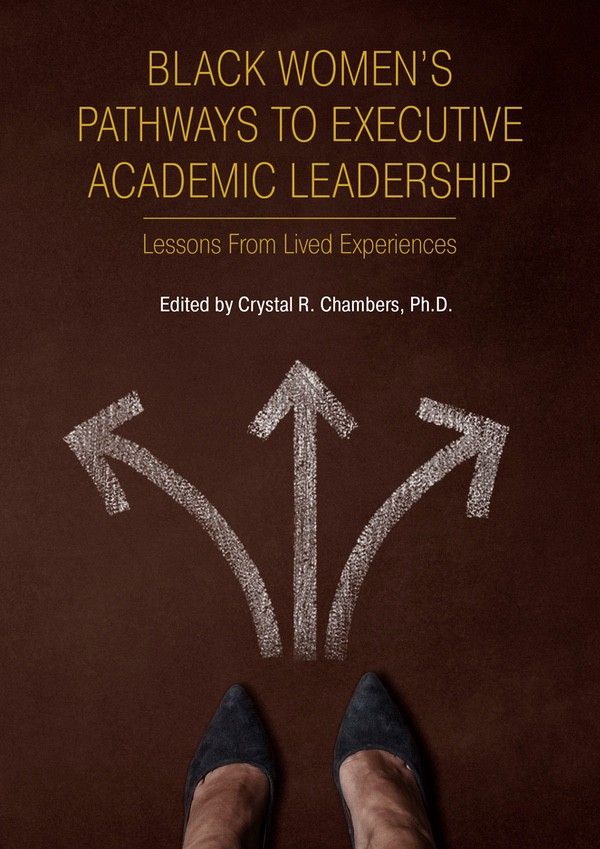Contributing Author/s

Universal Write Publications, LLC
Breaking Barriers: The Rise of Black Women in Academic Leadership
Breaking Barriers: The Rise of Black Women in Academic Leadership
Education is evolving rapidly, demanding diverse, responsive, and equitable leadership. For years, Black women have led academic institutions through the complexities of the present, and the inclusive educational systems for the future. Now, 55% of presidents in higher education are considering retirement within five years (ACE 2023). There is a pressing demand for leaders in higher education institutions.
We spoke with Dr. Crystal Chambers, editor of the new book Black Women’s Pathways to Executive Academic Leadership, about why this book is so important now. In the edited volume, authors provide a comprehensive analysis of the experiences and challenges faced by Black women leaders in community colleges, Historically Black colleges and universities (HBCUs), and predominantly White institutions (PWIs), offering a comprehensive, practical, and research-based exploration of executive academic leadership, providing valuable insights and guidance for current and aspiring leaders in higher education, and emphasize the importance of traditional and nontraditional leadership pathways to an ever-changing academic environment.
Why did you decide to publish Black Women’s Pathways to Executive Academic Leadership?
As leadership churn is becoming a recurrent theme in U.S. higher education contemporarily, this book provides practical advice for those considering presidential pathways and those in senior executive positions, including presidents. It also shares strategies for boards to recruit and attract highly qualified people to the presidency.
What is the current situation with Academic Leadership in higher education?
Twice as many men as women serve as presidents of the nation’s two- and four-year colleges and universities. Black women make up 5.45% of those presidencies (calculated from the 2023 Edition of the ACE Presidential Survey). Yet, according to the National Center for Education Statistics, Black women form 14.4% of women’s enrollments and 8.07% of all students. Women are more likely than men to climb the traditional academic leadership ladder, moving from department leadership to the deanship, to the senior executive academic officer’s position – the provost – before reaching their first presidency.
Sixty-five percent of all BIPOC women held senior campus leadership positions before becoming presidents, and Black women are more likely than others to have a range of experiences in business and legal affairs, student affairs, auxiliary services, and the like.
On the one hand, this shows the high level of leadership experience Black women had before taking presidential office. On the other, because it is taking longer for Black women to be credited for distinctive contributions at each rung of the leadership ladder, many may be dissuaded from presidential pursuits. What if women generally, Black women particularly, were afforded opportunities to lead earlier, as commensurate with their comparative experience? Would the numbers be more equitable?
Who were the inspiration for the book?
Authors of the present volume collected the narratives, along with corroborating data, of eleven Black women who were current or past presidents, or leaders in positions leading directly to the presidency. Here, they highlight the career paths of Black women senior executives at public four-year historically White and historically Black schools and community colleges. They examine the challenges these women faced as often the first or the only in leadership at their institution, how they overcame these difficulties, and how institutions can systematically remove roadblocks to leadership pathways. They also speak to the intentionality needed to broadly develop a diverse pool of leaders who are ready to guide American higher education into the future and give advice based on their experiences with boards of trustees, local political cultures, and the media.
You decided to not only explore the different pathways Black women can choose toward getting academic leadership, but also at different types of academic institutions. Please explain:
In Part I, the Community College Context, Dr. Katrina Arnold explores themes of spirituality, work-life balance, and support networks as crucial toward sustaining the passion to serve and reach leadership goals. She also speaks to efforts boards can make towards attracting Black women to the community college presidency.
In Part II, the Historically White Institutional Context, Dr. Tamika Williams analyzed interview data from Black women Provosts at four-year institutions, using the glass ceiling and glass cliff frameworks to understand the nature of executive leadership opportunities for Black women. Here, she also shares their advice on leadership transition, negotiation strategies, as well as strategies for self-encouragement, renewal, and the obligation to pay it forward.
In Part III, the Historically Black Institutional Context, Dr. Nichole Lewis discusses the notion of the prevailing climate, the impact of hidden organizational challenges, and relationships with the media. The retired presidents in her study shared the personal commitments made and gravitas of the presidential role, standards these met because they were grounded in a calling to serve.
This volume is punctuated by a foreword from Karrie Dixon, Chancellor of Elizabeth City State University, and an afterword, by Kassie Freeman, former Vice President for Academic and Student Affairs for the Southern University and A&M College Systems and President of the African Diaspora Consortium at Columbia University.
What does this book mean to you personally, and professionally?
At this critical historic juncture in academia, strong and knowledgeable presidents are needed to serve our nation’s campuses. We cannot afford to overlook the talent of Black women, those often serving as the one and only in our board rooms.
Disclaimer:
Article Tags
Related Title/s
Contributing Author/s

